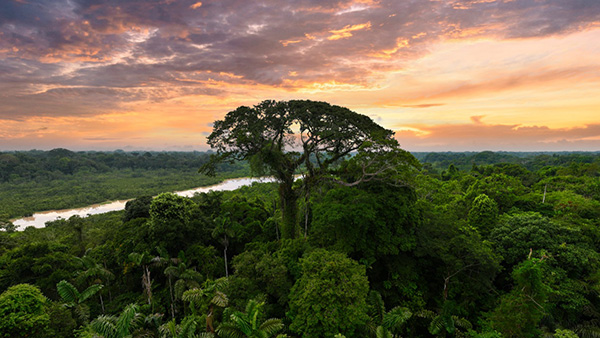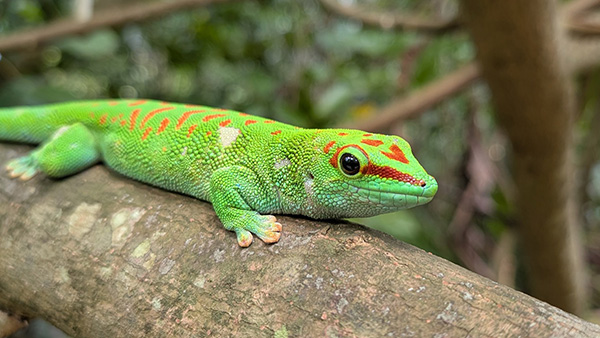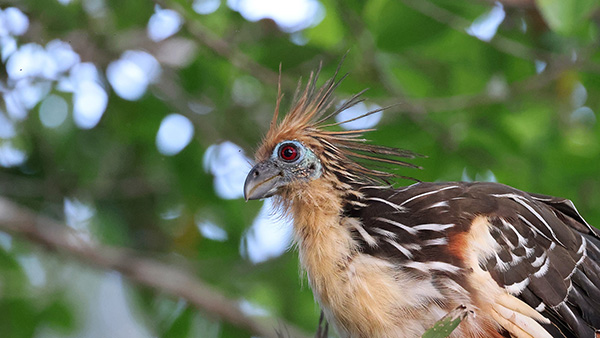WORLD RAINFOREST
By Rhett A. Butler Last updated Aug 14, 2020
The Tropical Rainforest - information on tropical forests, deforestation, and biodiversity
Sections:
The Latest News on Rainforests
Cocoa boom fuels new wave of deforestation in Cameroon (Aug 4 2025)
Once threatened by palm oil and loggers, Cameroon’s forests now face a new driver of deforestation: booming cacao production to supply the European market. A new report by the environmental advocacy group Mighty Earth finds deforestation in Cameroon has accelerated, with the country losing around 782,000 hectares (1.9 million acres), or 4.2% of its forest […]
Indonesian farmers plant hope for isolated Javan gibbons (Aug 1 2025)
In Indonesia’s Central Java province, two groups of Javan gibbons have become isolated in two small forest patches. To help the gibbons make their way to larger forest areas, a local NGO, SwaraOwa, is working with farmers in the region to restore and build “corridors” that would connect the fragmented forest blocks, Mongabay reported in […]
Uncovering forest loss in gorilla park six months after M23 offensive in the DRC (Jul 31 2025)
- Six months since M23 armed rebels took control of provincial capitals in the eastern Democratic Republic of Congo, local activists and satellite imagery collected by Mongabay have identified sites of expanding forest loss in Kahuzi-Biega National Park.
- Researchers say this is due to collapsing conservation efforts, lack of park monitoring, and massive logging and charcoal production inside the national park. While M23 and other militias don’t produce the charcoal directly, they profit by taxing its transport and trade.
- Activists who have denounced the illegal exploitation have been harassed, attacked, or even killed. Some, like Josue Aruna, have been forced into hiding or exile after facing death threats.
- On July 19, the DRC government and M23 signed a ceasefire agreement, with conservationists saying they hope this will create conditions for restoring security in the area and halt the destruction of the rainforest.
Indigenous leadership and science revive Panama’s degraded lands (Jul 31 2025)
Two Indigenous groups in Panama are collaborating with researchers in a long-term reforestation project that promises them income in return for growing native trees for carbon sequestration, Mongabay contributor Marlowe Starling reported in May. As part of the project, researchers from the Smithsonian Tropical Research Institute (STRI) have partnered with the local leadership in the […]
Arboreal camera traps reveal wildlife feasting on Borneo’s fruiting fig trees (Jul 31 2025)
Camera traps installed high in the rainforest canopy in Malaysian Borneo have filmed a bounty of threatened primates, hornbills and a host of tree-dwelling animals feasting on figs. Biologists from Malaysia-based nonprofit 1StopBorneo Wildlife, along with Sabah Parks and local conservationists, scaled two enormous fig trees in Tawau Hills National Park in Sabah state to […]
As Indonesia reclaims forests from palm oil, smallholders bear brunt of enforcement (Jul 30 2025)
- Indonesian authorities have reclaimed 2 million hectares (5 million acres) of forest from illegal oil palm plantations under a militarized crackdown, but critics say it disproportionately targets Indigenous communities and smallholders while sparing large corporations, deepening land inequality.
- Much of the reclaimed land is being handed over to state-owned plantation company PT Agrinas Palma Nusantara, raising concerns that private monopolies are being replaced by a state one, with some communities pushed into profit-sharing schemes critics call exploitative.
- In biodiversity-rich Tesso Nilo National Park, thousands of families are being forcibly evicted, while powerful figures like a local legislator evade sanctions, highlighting a two-tiered policing system.
- Activists are calling for a new forestry law to address outdated legislation, protect Indigenous land rights, mandate ecological restoration, and close legal loopholes that allow corporate violators to avoid accountability.
Peruvian rainforest defender shot dead in suspected targeted killing (Jul 29 2025)
Environmental activist Hipólito Quispe Huamán was shot and killed Saturday night in the Madre de Dios region of southeastern Peru, in what authorities suspect was a targeted attack linked to his work defending the Amazon rainforest, AFP reports. Quispe Huamán was driving along the Interoceanic Highway when he was gunned down, according to local prosecutors. […]
‘Insignificant risk’ EUDR proposal threatens fight against deforestation, critics say (Jul 24 2025)
- Some European Union officials want to simplify a section of the EU Deforestation Regulation (EUDR), the bloc’s landmark law that seeks to eliminate commodities associated with deforestation.
- A European Parliament proposal wants to reconsider a benchmarking system that categorizes trading partners into high, standard and low deforestation risk.
- Supporters of the proposal say EUDR rules are still too complicated for producers, while environmental groups say the world’s forests can’t afford further delays.
Where there’s political will, there’s a way to stop tropical deforestation, study finds (Jul 24 2025)
- A study focused on why deforestation rates have slowed in Indonesia and the Brazilian Amazon revealed that political will was a critical factor, often as a result of pressure from civil society and diplomacy to conserve forests.
- The authors surveyed the expert opinions of researchers, policymakers and advocates working on forest conservation in Brazil or Indonesia.
- In Brazil, experts said government action — like satellite monitoring and recognizing Indigenous lands — was key to stopping deforestation.
- Indonesia’s forest conservation success comes not just from political will, but also from corporate efforts and pressure from civil society groups.
Indonesian palm oil company sues experts who helped secure $18m pollution ruling (Jul 24 2025)
- Two top Indonesian environmental experts, Bambang Hero Saharjo and Basuki Wasis, are being sued by palm oil firm PT Kalimantan Lestari Mandiri for their court testimony that helped convict the company for massive fires in Borneo.
- The lawsuit is widely condemned as a SLAPP (strategic lawsuit against public participation) — a legal tactic to silence critics — and raises concerns about the chilling effect on scientists who testify in environmental cases.
- Despite existing anti-SLAPP regulations in Indonesia, poor enforcement has allowed such lawsuits to proceed, with activists calling the case a form of judicial harassment and an attempt to evade responsibility for ecological damage.
- The case highlights broader issues of corporate impunity and weak enforcement of environmental rulings, as the company continues to operate and burn peatland, even after a binding court order to pay fines and restore the land.
Ecuador’s new protected areas law sparks debate over security, development (Jul 23 2025)
- A new law on protected areas in Ecuador is designed to improve security, funding and economic development in the country’s 78 protected areas.
- It creates a new service to oversee management decisions and a trust to generate funding for protected areas, while mandating increased technical training for park rangers.
- It also strengthens partnerships with law enforcement and the military.
- Critics of the law say it militarizes the country’s protected areas and erodes the autonomy of local and Indigenous communities.
Mongabay journalist Karla Mendes wins 2025 Oakes Award for environmental journalism (Jul 23 2025)
Mongabay reporter Karla Mendes has won the 2025 John B. Oakes Award for Distinguished Environmental Journalism, announced on July 23. Her investigation in the Brazilian Amazon uncovered a direct connection between the expansion of the cattle industry in Maranhão state and an increase in violent crime against the inhabitants of the state’s Arariboia Indigenous Territory. […]
Nickel boom on an Indonesian island brings toxic seas, lost incomes, report says (Jul 23 2025)
- Nickel mining on Indonesia’s Kabaena Island has polluted the sea, degraded forests and disrupted the lives of Indigenous Bajau fishers and farmers, who have reported severe drops in income, fish catches and seaweed quality.
- The mining has harmed biodiversity, threatening leatherback turtle nesting sites and the island’s unique long-tailed macaques, while also causing health issues among locals, including skin and respiratory problems, according to a report by NGOs.
- Affected communities report land seizures without proper consultation or compensation, limited public participation, and criminalization of protests, all in violation of Indigenous rights and national laws.
- The report ties the mining firms to political elites and global EV supply chains, including alleged links to Tesla and Ford, and calls for mining permit audits, stronger protections for affected communities and full accountability from companies.
An aging leopard’s suffering sparks ethical debate in Sri Lanka (Jul 23 2025)
In Sri Lanka, the fate of an aging, injured leopard, well-loved by tourists, has triggered a debate. Wildlife enthusiasts are urging authorities to help the leopard, named Neluma, in Wilpattu National Park, Sri Lanka’s largest protected area. However, wildlife officials and conservationists are against intervening and providing veterinary support, Mongabay contributor Malaka Rodrigo reported in […]
Hope and frustration as Indonesia pilots FSC’s logging remedy framework (Jul 22 2025)
- Indonesia is the first test case for the Forest Stewardship Council’s new remedy framework, which allows logging firms to regain ethical certification by addressing past environmental and social harms.
- However, NGOs have found serious flaws in the process, including lack of consent, rushed assessments, and exclusion of many affected Indigenous communities.
- The process also faces backlash over poor transparency, intimidation of Indigenous rights activist, and allegations of undisclosed corporate ties to ongoing deforestation.
- Some communities see the framework as a rare chance to reclaim land and rights — but only if it becomes truly fair and accountable.
From deforestation to renewal: Why reforestation isn’t just about trees (Jul 20 2025)
- Sociologist Thomas Rudel explores the social and political forces behind global reforestation, arguing that forest regrowth is rarely automatic and often depends on human decisions and local conditions.
- He critiques top-down climate pledges for failing to engage with smallholder farmers and Indigenous communities, who are frequently the key actors in both forest loss and recovery.
- Rudel highlights the importance of “corporatist coalitions” that link global funders with grassroots actors, enabling more flexible and locally effective forest restoration efforts.
- Rudel spoke with Mongabay founder and CEO Rhett Ayers Butler in July 2025.
Landmark Indigenous land title in Ecuador protected area still in limbo (Jul 16 2025)
- Twenty months after a landmark court ruling granted the Siekopai Nation land rights within a protected Amazon area, the Ecuadorian government has yet to issue the official title, with sources citing legal issues, government hesitancy and intercommunity conflicts.
- Tensions have escalated between the Siekopai and the Kichwa de Zancudo Cocha communities, which both claim ancestral ties to the land, with reported incidents of violence and a lack of compromise.
- Some critics say the conflict stems from improper agreements made by the state without adequate consultation and that or a growing scarcity of land in the Amazon.
- Indigenous leaders and experts call for greater government accountability, improved mediation and potentially a jointly managed protected area to resolve the dispute and prevent similar conflicts in other regions of the country.
Landmark Indigenous land title in Ecuadorian Amazon reserve mired in controversy (Jul 15 2025)
- A 2023 court ruling granted land rights in Ecuador’s Cuyabeno Reserve to the Siekopai people, recognizing their ancestral ties and setting a precedent for Indigenous land claims in protected areas.
- The decision has sparked controversy, as it affects the Kichwa de Zancudo Cocha, another Indigenous people with ties to the same land and a government agreement.
- The case has raised broader concerns about inter-Indigenous conflict, the role of NGOs and the limits of state agreements in resolving overlapping land claims.
- Many Indigenous leaders argue that land titling is essential but warn that current legal approaches risk intensifying disputes rather than promoting shared stewardship.
Indigenous groups debate use of land agreements in Ecuador’s protected areas (Jul 15 2025)
- The Kichwa de Zancudo Cocha community lost some of the land it had been managing in the Cuyabeno Reserve under an agreement with the Ecuadorian government when the Siekopai Nation was awarded a land title in a 2023 court case.
- While these agreements have allowed Indigenous communities to manage ancestral lands in protected areas, critics argue they offer limited autonomy and can favor the government.
- Land titles provide greater self-determination and legal permanence for Indigenous communities, though some argue they could impact conservation efforts in protected areas.
- Some Indigenous leaders worry that the case could have side effects that aggravate disputes over ancestral land claims and undermine their own agreements, while others highlight that it’s an opportunity for communities to obtain firmer land rights.
Tropical forest roots show strain as changes aboveground filter below (Jul 15 2025)
- Tropical forest plant roots have not received as much research attention as aboveground vegetation. This knowledge gap affects our understanding of how rainforests adapt to change, including their ability to capture and store atmospheric carbon.
- An emerging field of research is looking at how root systems respond to global change. New evidence dramatically underlines the outsized importance of tropical forests in the global carbon cycle. Tropical forests represent one of the world’s largest carbon sinks, largely thanks to plant roots, which add carbon to soils.
- Despite the challenge of studying tiny roots hidden underground, researchers are uncovering important insights. Some tropical forests send roots deeper into the soil under dry conditions, possibly seeking moisture, which may aid in drought tolerance. Others seem unable to do this, making them more vulnerable to climate change.
- Recent plant root studies are confirming the immense stress tropical rainforests are under, with conditions changing faster than roots belowground can adapt. Knowing more precisely which forests can, and can’t, tolerate escalating climate change and other stressors could better inform management and conservation decisions.
‘Revolutionary technology’ uses scanners for easier species detection in the wild (Jul 15 2025)
Researchers in Brazil’s Amazonas state are testing easy-to-use scanners that can help them identify animal species they come across in the wild, Mongabay contributor Miguel Monteiro reported in June. The scanners use a technology called near-infrared spectroscopy (NIRS), which currently has many applications, from measuring food quality to monitoring blood oxygen levels in the medical […]
Ecuador’s government promised same land in the Amazon to two Indigenous peoples (Jul 14 2025)
- A court in Ecuador ordered the delivery of a property title within the Cuyabeno Reserve to the Siekopai Nation, intensifying a long-simmering dispute with the Kichwa de Zancudo Cocha community, which also has claims to the land.
- The ruling challenges an existing 2008 land and conservation agreement between the Kichwa community and the environment ministry, with the former set on armed resistance.
- Some observers argue that the government’s failure to properly consult all affected groups before signing land agreements has fueled this dispute.
- Indigenous people are calling for a peaceful resolution of the conflict amid growing concerns that the ruling could impact other land agreements and intensify Indigenous land conflicts in Ecuador’s Amazon.
Attack on Indigenous land defenders in Peru reveals snags in protection system (Jul 14 2025)
- In April 2025, members of the community forest monitoring committee from the Kakataibo Indigenous community in Peru’s Mariscal Cáceres province were attacked while patrolling their ancestral territory.
- Organizations that support environmental defenders have criticized the slow response and lack of action from the Intersectoral Mechanism for the Protection of Human Rights Defenders.
- For several months, emails and formal requests for meetings and other forms of support have gone unanswered.
- According to the Ministry of Justice and Human Rights, between April 2021 and April 2025, the Intersectoral Mechanism registered 706 human rights defenders and 64 of their family members.
What’s holding back natural climate solutions? (Jul 14 2025)
Founder’s Briefs: An occasional series where Mongabay founder Rhett Ayers Butler shares analysis, perspectives and story summaries. Natural climate solutions, or NCS, range from reforestation and agroforestry to wetland restoration, and have long been championed as low-cost, high-benefit pathways for reducing greenhouse gases. In theory, they could provide more than a third of the climate […]
Iconic Brazil nut crop plunges after extreme drought, skyrocketing prices (Jul 10 2025)
- Communities in the Amazon reported severe cuts of up to 80% of Brazil nut crops, with some territories collecting “not even a single nut.”
- The nut tree, which can live up to 800 years, is crucial for forest economies and ecosystems, but is increasingly vulnerable to extreme climate events, such as the historic droughts of 2023 and 2024.
- Sold worldwide, the Brazil nut’s price soared fourfold, prompting experts to warn of market instability if buyers abandon it, urging recognition of their ecological value and continued inclusion in product lines.

































